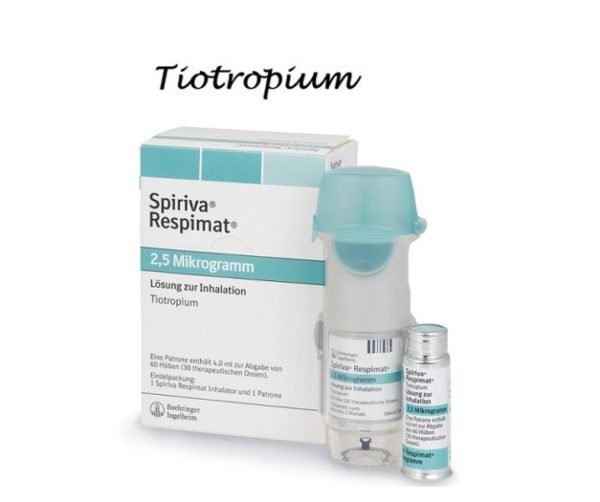Tiotropium (Spiriva) is an anticholinergic medicine that competitively and reversibly inhibits the M-3 muscarinic receptors in the bronchial smooth muscles resulting in bronchodilation.
-
Asthma (Spiriva Respimat only):
- It is used in the maintenance treatment of asthma in patients 6 years of age or older.
-
Chronic obstructive pulmonary disease:
- It is used in the maintenance treatment of bronchospasm associated with chronic obstructive pulmonary disease (COPD) and the reduction of COPD exacerbations.
- It is not indicated for the relief of acute bronchospasm (in which case oral steroids or inhalational steroids should be used along with bronchodilators like albuterol)
Tiotropium Dose in Adults
Dose in the treatment of Asthma:
- Oral inhalation: Spiriva Respimat (1.25 mcg/actuation):
Soft-mist inhaler: Two inhalations (2.5 mcg) once daily given maximum dose is 2 inhalations per 24 hours.
- Maximum benefits can take up to 4 to 8 weeks of dosing.
Dose in the treatment of COPD: Oral inhalation:
-
Spiriva HandiHaler:
- Dry powder inhaler:
- Contents of 1 capsule (18 mcg) are inhaled once daily using the HandiHaler device.
- To ensure drug delivery, the contents of each capsule are inhaled twice.
- Dry powder inhaler:
-
Spiriva Respimat (2.5 mcg/actuation):
- Soft-mist inhaler:
- Two inhalations (5 mcg) given once daily
- The maximum dose is 2 inhalations per 24 hours.
- Soft-mist inhaler:
Tiotropium Dose in Children
Dosage in the treatment of Asthma:
- Children ≥6 years of age and Adolescents:
- Inhalation: Spiriva Respimat (1.25 mcg/actuation):
- Soft-mist inhaler: Refer to adult dosing.
Off label dosage in the treatment of Asthma, severe symptomatic:
- Children ≥6 to 11 years of age:
- Inhalation: Spiriva Respimat (2.5 mcg/actuation):
- Soft-mist inhaler:
- Two inhalations (5 mcg) are once daily as add-on therapy to inhaled corticosteroids and other maintenance therapies.
- Soft-mist inhaler:
- Inhalation: Spiriva Respimat (2.5 mcg/actuation):
Tiotropium pregnancy Risk Factor: C
- Animal reproduction studies have shown that adverse events can be observed.
Tiotropium use during breastfeeding:
- It is unknown if breast milk contains tiotropium or not.
- According to the manufacturer of the product, when deciding whether to continue or stop breastfeeding during therapy, it is important to consider the risks to infant exposure, the benefits to the infant and the benefits to the mother.
Tiotropium (Spiriva) dose in Kidney disease:
-
CrCl >60 mL/minute:
- No dosage adjustment required.
-
CrCl ≤60 mL/minute:
- No dosage adjustment required;
- use cautiously and closely for anticholinergic adverse events.
Tiotropium Dose in Liver Disease:
No dosage adjustment required in patients with liver disease.
Common Side Effects of Tiotropium (Spiriva) Include:
-
Gastrointestinal:
- Xerostomia
-
Respiratory:
- Upper respiratory tract infection
- Pharyngitis
- Sinusitis
Less Common Side Effects of Tiotropium (Spiriva) Include:
-
Cardiovascular:
- Chest Pain
- Edema
- Angina Pectoris
- Palpitations
- Hypertension
-
Central Nervous System:
- Headache
- Depression
- Insomnia
- Paresthesia
- Dizziness
- Voice Disorder
-
Dermatologic:
- Skin Rash
- Pruritus
-
Endocrine & Metabolic:
- Hypercholesterolemia
- Hyperglycemia
-
Gastrointestinal:
- Abdominal Pain
- Dyspepsia
- Constipation
- Vomiting
- Gastrointestinal Disease
- Gastroesophageal Reflux Disease
- Oropharyngeal Candidiasis
- Stomatitis
- Diarrhea
-
Genitourinary:
- Urinary Tract Infection
-
Hypersensitivity:
- Hypersensitivity Reaction
-
Infection:
- Candidiasis
- Infection
- Herpes Zoster
-
Neuromuscular & Skeletal:
- Arthralgia
- Myalgia
- Arthritis
- Leg Pain
- Skeletal Pain
-
Ophthalmic:
- Cataract
-
Respiratory:
- Rhinitis
- Epistaxis
- Cough
- Flu-Like Symptoms
- Bronchitis
- Laryngitis
- Allergic Rhinitis
-
Miscellaneous:
- Fever
Contraindication to Tiotropium (Spiriva) Include:
- Hypersensitivity to tiotropium or any component of the formulation
- Hypersensitivity to atropine and its derivatives
Warnings and precautions
-
Bronchospasm
- Inhaled drugs can cause paradoxical bronchospasm.
- If bronchospasm is present, discontinue use and seek other treatment.
-
CNS effects
- It can cause blurred vision and dizziness.
- Patients should be cautious when performing tasks that require mental alertness, such as operating machinery or driving.
-
Hypersensitivity reactions
- It has been reported that there have been immediate hypersensitivity reactions such as urticaria, angioedema and rash.
- If you notice any symptoms, stop immediately.
- Patients with a history or hypersensitivity to atropine should be cautious.
-
Glaucoma:
- This may make narrow-angle glaucoma treatment more challenging.
-
Bladder neck obstruction/prostatic hyperplasia:
- Prostatic hyperplasia or bladder neck obstruction can be worsened.
-
Renal impairment
- Patients with severe or moderate renal impairment (CrCl =60mL/minute) should be cautious.
- Pay attention to anticholinergic adverse reactions.
Tiotropium: Drug Interaction
|
Acetylcholinesterase Inhibitors |
May reduce an anticholinergic agent's therapeutic impact. Acetylcholinesterase Inhibitors' therapeutic impact may be reduced by anticholinergic drugs. |
|
Amantadine |
May strengthen an anticholinergic agent's anticholinergic action. |
|
Botulinum Toxin-Containing Products |
May strengthen an anticholinergic agent's anticholinergic action. |
|
Cannabinoid-Containing Products |
Cannabinoid-containing products' tachycardic impact may be enhanced by anticholinergic agents. Cannabidiol is an exception. |
|
Chloral Betaine |
May enhance the adverse/toxic effect of Anticholinergic Agents. |
|
Gastrointestinal Agents (Prokinetic) |
Anticholinergic Agents may diminish the therapeutic effect of Gastrointestinal Agents (Prokinetic). |
|
Glucagon |
Anticholinergic Agents may enhance the adverse/toxic effect of Glucagon. Specifically, the risk of gastrointestinal adverse effects may be increased. |
|
Itopride |
Itopride's therapeutic impact may be diminished by anticholinergic drugs. |
|
Mianserin |
May strengthen an anticholinergic agent's anticholinergic action. |
|
Mirabegron |
Anticholinergic drugs may make Mirabegron's harmful or hazardous effects worse. |
|
Nitroglycerin |
Nitroglycerin absorption may be decreased by anticholinergic agents. Anticholinergic medications specifically have the potential to impede or prevent the absorption of nitroglycerin by reducing the breakdown of sublingual nitroglycerin pills. |
|
Opioid Agonists |
Anticholinergic drugs may make opioid agonists more harmful or toxic. In particular, this combination may raise the risk for constipation and bladder retention. |
|
Ramosetron |
Ramosetron's constipating effects may be enhanced by anticholinergic drugs. |
|
Thiazide and Thiazide-Like Diuretics |
Anticholinergic Agents may increase the serum concentration of Thiazide and Thiazide-Like Diuretics. |
|
Topiramate |
Anticholinergic Agents may enhance the adverse/toxic effect of Topiramate. |
|
Pramlintide |
May enhance the anticholinergic effect of Anticholinergic Agents. These effects are specific to the GI tract. |
|
Secretin |
Anticholinergic Agents may diminish the therapeutic effect of Secretin. Management: Avoid concomitant use of anticholinergic agents and secretin. Discontinue anticholinergic agents at least 5 half-lives prior to administration of secretin. |
|
Aclidinium |
May enhance the anticholinergic effect of Anticholinergic Agents. |
|
Anticholinergic Agents |
May enhance the anticholinergic effect of Tiotropium. |
|
Cimetropium |
Anticholinergic Agents may enhance the anticholinergic effect of Cimetropium. |
|
Eluxadoline |
Anticholinergic Agents may enhance the constipating effect of Eluxadoline. |
|
Glycopyrrolate (Oral Inhalation) |
Anticholinergic Agents may enhance the anticholinergic effect of Glycopyrrolate (Oral Inhalation). |
|
Glycopyrronium (Topical) |
May enhance the anticholinergic effect of Anticholinergic Agents. |
|
Ipratropium (Oral Inhalation) |
May enhance the anticholinergic effect of Anticholinergic Agents. |
|
Levosulpiride |
Anticholinergic Agents may diminish the therapeutic effect of Levosulpiride. |
|
Loxapine |
Agents to Treat Airway Disease may enhance the adverse/toxic effect of Loxapine. More specifically, the use of Agents to Treat Airway Disease is likely a marker of patients who are likely at a greater risk for experiencing significant bronchospasm from use of inhaled loxapine. Management: This is specific to the Adasuve brand of loxapine, which is an inhaled formulation. This does not apply to non-inhaled formulations of loxapine. |
|
Oxatomide |
May enhance the anticholinergic effect of Anticholinergic Agents. |
|
Potassium Chloride |
Anticholinergic Agents may enhance the ulcerogenic effect of Potassium Chloride. Management: Patients on drugs with substantial anticholinergic effects should avoid using any solid oral dosage form of potassium chloride. |
|
Potassium Citrate |
Anticholinergic Agents may enhance the ulcerogenic effect of Potassium Citrate. |
|
Revefenacin |
Anticholinergic Agents may enhance the anticholinergic effect of Revefenacin. |
|
Umeclidinium |
May enhance the anticholinergic effect of Anticholinergic Agents. |
Monitor:
- FEV-1, peak flow (or other pulmonary function studies);
- anticholinergic side effects (patients with CrCl ≤50 mL/min);
- signs and symptoms of narrow-angle glaucoma and urinary retention
How to administer Tiotropium (Spiriva)?
For oral inhalation only.
Spiriva HandiHaler: Dry powder inhaler:
- Do not swallow the capsule.
- Give it at the same time each day.
- Do not remove the capsule from the blister until immediately before using it.
- Place capsule in center chamber of the HandiHaler Inhaler.
- Should only use the HandiHaler Inhaler.
- Close mouthpiece firmly until a click is heard & leave dust cap open.
- The capsule is pierced by pressing and releasing the green piercing button present on the side of the HandiHaler device.
- Exhale fully.
- Close lips tight around mouthpiece;
- do not exhale into the inhaler.
- Tilt head slightly back and inhale (steadily, rapidly, and deeply);
- the capsule vibration (rattle) CAN be heard within the device.
- Hold the breath for few seconds then repeat the same technique using the same tiotropium capsule.
- Throw away the empty capsule
- do not leave capsule in the inhaler.
- Keep capsules and inhaler dry.
- Discard any capsules which are exposed to air and not used immediately.
Spiriva Respimat: Soft-mist inhaler:
- Before first use, insert the cartridge into the inhaler and prime the unit by actuating the inhaler toward the ground till aerosol cloud is visible;
- Then repeat three more times and then the unit is primed and ready for use.
- If it is not used for more than 3 days, actuate the inhaler once to prepare the inhaler for use.
- If it is not used for more than 21 days, actuate the inhaler until an aerosol cloud is visible and then repeat the process three more times to prepare the inhaler for use.
Mechanism of action of Tiotropium (Spiriva):
- It inhibits competitively and reversibly the action of acetylcholine (M-3) receptors within the bronchial smooth muscles, causing bronchodilation
Absorption:
- It is Poorly absorbed from the GI tract, systemic absorption can occur from lung
Distribution:
- V : 32 L/kg
Protein binding:
- 72%
Metabolism:
- Hepatic metabolism is minimal, via CYP2D6 and CYP3A4
Bioavailability:
- Following inhalation, 19.5% (dry powder inhaler) or almost 33% (soft-mist inhaler)
- Oral solution: 2% to 3%
Half-life elimination:
- Dry powder inhaler: COPD: almost 25 hours
- Soft-mist inhaler : Asthma: 44 hours; COPD: 25 hours
Time to peak, plasma:
- Dry powder inhaler: 7 minutes after inhalation
- Soft-mist inhaler: 5 to 7 minutes after inhalation
Excretion:
- In Urine (7% of inhaled dose [dry powder inhaler]; 18.6% of single inhaled dose [COPD] or 12.8% [asthma] [soft-mist inhaler])
International Brands of Tiotropium:
- Spiriva HandiHaler
- Spiriva Respimat
- Braltus
- Dilriva Unicap
- Favint
- Inhalex
- Neumotropio
- Norvent
- Spiriva
- Spiriva Handihaler
- Spiriva Respimat
- Spivira
- Srivasso
- Teromar
- Tioriva Bexicap
- Tiova Rotacaps
- Triomate
- Triomid
Tiotropium Brands in Pakistan:
Tiotropium [Rota Caps 18 mcg] |
|
| Tio-Veez | Macter International (Pvt) Ltd. |
| Tiovair | Highnoon Laboratories Ltd. |



 for multiple myeloma.webp)
.jpg)